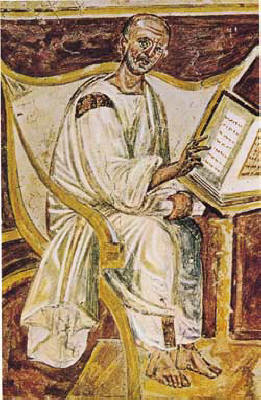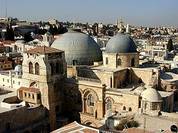
The Mighty Augustine and the Bible:
from Pope Leo XII in Providentissimus Deus
“. . . the rule so wisely laid down by St. Augustine-not to depart from the literal and obvious sense, except only where reason makes it untenable or necessity requires;(40) a rule to which it is the more necessary to adhere strictly in these times, when the thirst for novelty and unrestrained freedom of thought make the danger of error most real and proximate. Neither should those passages be neglected which the Fathers have understood in an allegorical or figurative sense, more especially when such interpretation is justified by the literal, and when it rests on the authority of many. For this method of interpretation has been received by the Church from the Apostles, and has been approved by her own practice, as the holy Liturgy attests; (PD 15)
"On my part I confess to your charity that it is only to those Books of Scripture which are now called canonical that I have learned to pay such honor and reverence as to believe most firmly that none of their writers has fallen into any error. And if in these Books I meet anything which seems contrary to truth, I shall not hesitate to conclude either that the text is faulty, or that the translator has not expressed the meaning of the passage, or that I myself do not understand."( Ep. lxxxii., i. et crebrius alibi.)
Wherefore, as no one should be so presumptuous as to think that he understands the whole of the Scripture, in which St. Augustine himself confessed that there was more that he did not know, than that he knew,( ad lanuar. ep. lv., 21) so, if he should come upon anything that seems incapable of solution, he must take to heart the cautious rule of the same holy Doctor: "It is better even to be oppressed by unknown but useful signs, than to interpret them uselessly and thus to throw off the yoke only to be caught in the trap of error. "( De door. chr. iii., 9, 18.)
….as St. Augustine warns us, "not to make rash assertions, or to assert what is not known as known."(51) If dissension should arise between them, here is the rule also laid down by St. Augustine, for the theologian: "Whatever they can really demonstrate to be true of physical nature, we must show to be capable of reconciliation with our Scriptures; and whatever they assert in their treatises which is contrary to these Scriptures of ours, that is to Catholic faith, we must either prove it as well as we can to be entirely false, or at all events we must, without the smallest hesitation, believe it to be so."(52) To understand how just is the rule here formulated we must remember, first, that the sacred writers, or to speak more accurately, the Holy Ghost "Who spoke by them, did not intend to teach men these things (that is to say, the essential nature of the things of the visible universe), things in no way profitable unto salvation."(53) Hence they did not seek to penetrate the secrets of nature, but rather described and dealt with things in more or less figurative language, or in terms which were commonly used at the time, and which in many instances are in daily use at this day, even by the most eminent men of science. Ordinary speech primarily and properly describes what comes under the senses; and somewhat in the same way the sacred writers-as the Angelic Doctor also reminds us - `went by what sensibly appeared,"(54) or put down what God, speaking to men, signified, in the way men could understand and were accustomed to.
"Those," he says, "who are zealous in the work of preaching must never cease the study of the written word of God."(20) St. Augustine, however, warns us that "vainly does the preacher utter the Word of God exteriorly unless he listens to it interiorly;"
the "examination of older tongues,"(30) to quote St. Augustine, will be useful and advantageous. But in this matter we need hardly say that the greatest prudence is required, for the "office of a commentator," as St. Jerome says, "is to set forth not what he himself would prefer, but what his author says."
This is inculcated by St. Jerome, and still more frequently by St. Augustine, who thus justly complains: "If there is no branch of teaching, however humble and easy to learn, which does not require a master, what can be a greater sign of rashness and pride than to refuse to study the Books of the divine mysteries by the help of those who have interpreted them?"
But he must not on that account consider that it is forbidden, when just cause exists, to push inquiry and exposition beyond what the Fathers have done; provided he carefully observes the rule so wisely laid down by St. Augustine-not to depart from the literal and obvious sense, except only where reason makes it untenable or necessity requires;(40) a rule to which it is the more necessary to adhere strictly in these times, when the thirst for novelty and unrestrained freedom of thought make the danger of error most real and proximate
from Pope Leo XII in Providentissimus Deus
“. . . the rule so wisely laid down by St. Augustine-not to depart from the literal and obvious sense, except only where reason makes it untenable or necessity requires;(40) a rule to which it is the more necessary to adhere strictly in these times, when the thirst for novelty and unrestrained freedom of thought make the danger of error most real and proximate. Neither should those passages be neglected which the Fathers have understood in an allegorical or figurative sense, more especially when such interpretation is justified by the literal, and when it rests on the authority of many. For this method of interpretation has been received by the Church from the Apostles, and has been approved by her own practice, as the holy Liturgy attests; (PD 15)
"On my part I confess to your charity that it is only to those Books of Scripture which are now called canonical that I have learned to pay such honor and reverence as to believe most firmly that none of their writers has fallen into any error. And if in these Books I meet anything which seems contrary to truth, I shall not hesitate to conclude either that the text is faulty, or that the translator has not expressed the meaning of the passage, or that I myself do not understand."( Ep. lxxxii., i. et crebrius alibi.)
Wherefore, as no one should be so presumptuous as to think that he understands the whole of the Scripture, in which St. Augustine himself confessed that there was more that he did not know, than that he knew,( ad lanuar. ep. lv., 21) so, if he should come upon anything that seems incapable of solution, he must take to heart the cautious rule of the same holy Doctor: "It is better even to be oppressed by unknown but useful signs, than to interpret them uselessly and thus to throw off the yoke only to be caught in the trap of error. "( De door. chr. iii., 9, 18.)
….as St. Augustine warns us, "not to make rash assertions, or to assert what is not known as known."(51) If dissension should arise between them, here is the rule also laid down by St. Augustine, for the theologian: "Whatever they can really demonstrate to be true of physical nature, we must show to be capable of reconciliation with our Scriptures; and whatever they assert in their treatises which is contrary to these Scriptures of ours, that is to Catholic faith, we must either prove it as well as we can to be entirely false, or at all events we must, without the smallest hesitation, believe it to be so."(52) To understand how just is the rule here formulated we must remember, first, that the sacred writers, or to speak more accurately, the Holy Ghost "Who spoke by them, did not intend to teach men these things (that is to say, the essential nature of the things of the visible universe), things in no way profitable unto salvation."(53) Hence they did not seek to penetrate the secrets of nature, but rather described and dealt with things in more or less figurative language, or in terms which were commonly used at the time, and which in many instances are in daily use at this day, even by the most eminent men of science. Ordinary speech primarily and properly describes what comes under the senses; and somewhat in the same way the sacred writers-as the Angelic Doctor also reminds us - `went by what sensibly appeared,"(54) or put down what God, speaking to men, signified, in the way men could understand and were accustomed to.
"Those," he says, "who are zealous in the work of preaching must never cease the study of the written word of God."(20) St. Augustine, however, warns us that "vainly does the preacher utter the Word of God exteriorly unless he listens to it interiorly;"
the "examination of older tongues,"(30) to quote St. Augustine, will be useful and advantageous. But in this matter we need hardly say that the greatest prudence is required, for the "office of a commentator," as St. Jerome says, "is to set forth not what he himself would prefer, but what his author says."
This is inculcated by St. Jerome, and still more frequently by St. Augustine, who thus justly complains: "If there is no branch of teaching, however humble and easy to learn, which does not require a master, what can be a greater sign of rashness and pride than to refuse to study the Books of the divine mysteries by the help of those who have interpreted them?"
But he must not on that account consider that it is forbidden, when just cause exists, to push inquiry and exposition beyond what the Fathers have done; provided he carefully observes the rule so wisely laid down by St. Augustine-not to depart from the literal and obvious sense, except only where reason makes it untenable or necessity requires;(40) a rule to which it is the more necessary to adhere strictly in these times, when the thirst for novelty and unrestrained freedom of thought make the danger of error most real and proximate
 RSS Feed
RSS Feed

